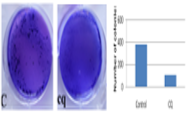Abstract
Cancer is the second leading cause of death globally. Among the group of cancer diseases, breast cancer is the most common type of cancer to affect women. The treatment options that are currently available for this include surgery, radiation therapy and therapy through medication or drugs. But, since all these are harmful and have severe side effects, drugs from natural plant compounds are being developed to act against cancer and its metastatic activity. The aim of this article is to perform in silico studies to identify phytochemicals in Cissus quadrangularis that can act against breast cancer, predict its targets and study its properties using bioinformatic tools and databases. It also involves studying of anticancer and anti-metastatic activity of the plant, Cissus quadrangularis (CQ) in MCF-7 breast cancer cell lines. CQ, a perennial plant of the grape family, has many medicinal benefits including antioxidant and anticancer properties. Alpha-amyrin, a terpenoid, was selected as a potential phytochemical in CQ and its ADME properties were studied using SwissADME. Then, its target was identified as androgen receptor using Swiss Target Prediction. Plant extract of CQ was prepared by ethyl acetate extraction method. Various tests such as MTT assay, Wound healing assay, DNA fragmentation assay, Caspase 7/9 induction detection assay and Annexin V assay were performed to evaluate the anticancer and anti-metastatic activity of CQ extract in MCF-7 cell lines. The results of the tests showed good anticancer and anti-metastasis activity of CQ with an IC50 value of 141.369µg/mL. It can be concluded that CQ has the properties required to act against breast cancer with the dose being directly proportional to the efficiency of CQ on the cancer cells.
Full text article
Authors

This work is licensed under a Creative Commons Attribution-NonCommercial-NoDerivatives 4.0 International License.

